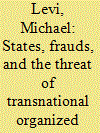| Srl | Item |
| 1 |
ID:
122910


|
|
|
|
|
| Publication |
2013.
|
| Summary/Abstract |
Since the Asian financial crisis in 1997, there has been renewed interest in corporate governance policies and practices. This study focuses on corporate governance practices in Malaysia, where the increasing incidence of fraud suggests a lack of adequate corporate governance systems in Malaysian listed companies. Using an unbalanced data set comprising 200 companies representing a total of 579 firm-year observations, this study examines the effects of internal corporate governance mechanisms on the occurrence of fraud. Specifically, it looks at the effects of board characteristics, ownership structure and quality of audit on the occurrence of fraud in Malaysian listed companies from 2007 to 2009. The findings indicate that the number of board meetings was positively associated with the occurrence of fraud, but both state and foreign ownership revealed a negative correlation, whereas factors including the number of independent directors, board size, CEO duality and the quality of audit had no observable effects.
|
|
|
|
|
|
|
|
|
|
|
|
|
|
|
|
| 2 |
ID:
141754


|
|
|
| 3 |
ID:
117957


|
|
|
|
|
| Publication |
2012.
|
| Summary/Abstract |
Fraud and corruption are very serious threats to some states and are harmful to all; however, this threat is seldom connected to transnational organized crime (TOC). We cannot examine social problems in a vacuum; we have to construct images of threats through the lens of the social and political threats posed by different aspects of crime and its organization. Harm and threat are not just about their economic cost, but also about how different phenomena hurt our confidence that we can control our surroundings and our future expectations. This anxiety can affect entities such as nation states or even trans-state entities such as "Ummah Wahidah"-the Islamic global community. The aim of this article is threefold: to disentangle the real and imagined threats of fraud, detail the involvement of transnational organized crime groups in fraud, and determine who or what can be reasonably described as threatened by these phenomena. This article rejects the implicit binary view that states are either threatened or not threatened, referring rather to a scale of threat to both states and different sectors within the state. This article critiques the value of Moisés Naím's concept of 'mafia state' to explaining and understanding fraud.
|
|
|
|
|
|
|
|
|
|
|
|
|
|
|
|